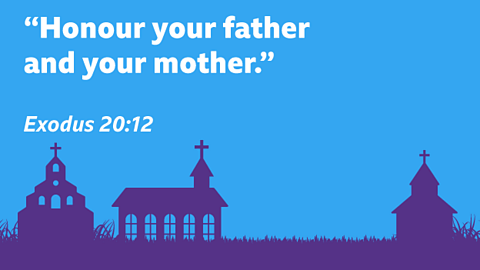Key points about marriage and the family
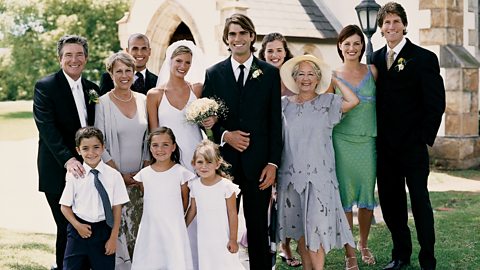
- Christianity teaches that the Church should be the foundation of family life.
- As part of the wider Christian family, the local parish will offer support to families, recognising the needs that families have in life.
- Most Christians believe marriage is important, but there are different views about divorce and remarriage within the religion.
- Some Christians believe the The BibleThe holy book of Christians. It has 66 books split into two sections: Old Testament and New Testament. teaches God made male and female to complete each other and procreate/procreationTo produce/the production of offspring by means of sexual reproduction..
- There are a range of views towards homosexualityBeing attracted to people of one's own sex or gender. within Christian denominationsA group within a religion. Christian denominations include, for example, Roman Catholic and Anglican denominations..
- The Bible teaches that all humans are equal, but views differ on the roles of men and women in Christian worship.


МэМэ
МэМэ
МэМэ
Remember
There are a range of Christian denominations, and therefore various Christian teachings on ethical issues.
Video
Watch the video below to compare Christian, Hindu and Muslim attitudes and teachings towards marriage.
Christian
I'm a Christian.
Hindu
I'm a Hindu.
Muslim
And I'm a Muslim.
Christian
And we all believe that marriage is important.
Hindu
And it should be for life.
Muslim
Which is fine if everything goes well.
Christian
But what if it doesn't?
Hindu
Divorce is legal in the UK,
Muslim
but do our religions ever allow it?
Christian
Christianity teaches that men and women should get married and have children.
Hindu
And it's the same in Hinduism.
Muslim
Same in Islam.
Christian
In the Roman Catholic Church, marriage is one of seven sacraments, which are holy ceremonies, so marriage isn't taken lightly. In all Christian denominations, the wedding takes place in a church, and the bride and groom make solemn promises called vows to each other and before God, to be faithful to one another and to stay together till death do us part.
Hindu
It's a HinduвҖҷs 'dharma' - our duty - to pass through four stages of life called 'ashramas'. The second ashrama is the householder stage, and it begins when someone gets married. A priest called a 'Pandit' performs the wedding ceremony, and the bride and groom make their vows in front of the sacred fire, which represents Brahman, the one unseen spirit. And, according to the Rig Veda, one of our holy books, marriage is for life.
Muslim
Many Muslims get married because that's what the Prophet Muhammad (sala Allahu alayhi wasalam), did and we want to follow his example. He called getting married вҖҳhalf the faithвҖҷ because it's that important. A Muslim wedding can take place anywhere. All you need is a marriage contract, called the вҖҳNikahвҖҷ in Arabic, and two people to witness it being signed.
Christian
Because marriage is so important, divorce has traditionally been seen as something that Christians just shouldn't do. Although Jesus did allow divorce if one or both of the partners has been unfaithful. But even if a couple are given a legal divorce, the Roman Catholic Church doesn't accept it because it believes that the couple are still married in the eyes of God. Sometimes the Church might agree that there are grounds for separation or annulment. The Church of England and other Protestant denominations, such as the Methodist Church and the United Reformed Church, do allow divorce. But some churches don't allow remarriage. It's often left up to the priest or pastor to make the decision.
Hindu
Our religion doesn't allow divorce, but that doesn't mean that Hindu marriages don't break up. In India, the Hindu Marriage Act 1955 made divorce legal. So many Hindus worldwide have taken this to mean that divorce is sometimes acceptable. But it can be hard for Hindus to remarry. Most Pandits won't perform a second marriage ceremony because Hinduism teaches that a husband and wife become one being when they get married the first time.
Muslim
It's a bit different in Islam because the marriage is mainly seen as a contract between two people, not between the couple and Allah, divorce is allowed, but only as a last resort. The Prophet Muhammad (sala Allahu alayhi wasalam), called it вҖҳthe most detestable act that God has permittedвҖҷ.
Christian
I believe that people should get married if they're going to have children, so it's a big commitment. It's a spiritual and legal bond which should last a lifetime. But even though as a Catholic, I'm taught that divorce is never okay, I personally think that in cases where someone's being unfaithful or if there's abuse happening, then divorce should be an option because I believe that God is loving and forgiving.
Muslim
Every case is different. And Muslims believe that Allah is Al- Ghaffar, the Great Forgiver, and understands that sometimes we humans get things wrong and need another chance.
Hindu
We all believe that marriage is a gift from God.
Christian
And that gift shouldn't be wasted.
Muslim
So divorce should always be a last resort. But what do you think?
The purpose of the Christian family
The family is the original cell of social life."
The Catechism of the Catholic Church - paragraph 2207
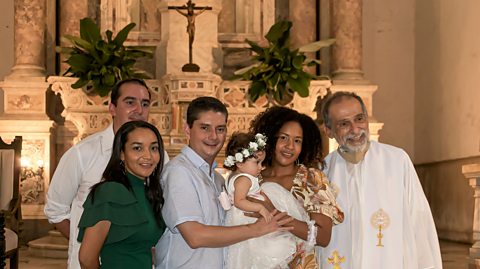
For most Christians, the family is an important institution and can include traditionalвҖҜnuclear familyA family unit consisting of two adults and any number of children living together. The children might be biological, step or adopted., stepfamilies, extended families and same-sex parents.
Christian teachings refer to God as the Father, creator, and sustainer of all living things. Many Christians see this as evidence that family relationships reflect GodвҖҷs parental care for all humanity and the family unit is important for society, as well as the Christian faith.
Christians can look to the Bible for guidance on relationships with their family members. For example, theвҖҜTen CommandmentsThe list of rules, revealed by God to Moses, found in the Old Testament books of Exodus and Deuteronomy. Also known as the Decalogue.вҖҜinstructs Christians to appreciate and respect their parents:
Honour your father and your mother.вҖқ
Exodus 20:12

The three main purposes of the Christian family
Depending on the denomination, the purpose of the Christian family might include:
To provide a secure environment for family through marriage вҖ“ Many Christians believe that marriage is a commitment for couples to love and support each other and share in the care and upbringing of children. As Jesus said: вҖңLove one another: just as I have loved you,вҖқ (John 13:34).
To procreate вҖ“ In Genesis, God tells a man to be with his wife and as a couple to have children: вҖңBe fruitful and multiply,вҖқ (Genesis 1:28). Many Christians understand this verse to be a command to leave their parents, get married and then have children in that order.
To raise children in the Christian faith вҖ“ Verses such as: вҖңStart children off on the way they should go,вҖқ (Proverbs 22:6) encourage Christians to bring their children up in their faith. Depending on the denomination, this may include: Baptism, Holy Communion, Confirmation and reading the Bible.
GCSE exam-style question
Outline three Bible teachings about the role of family members.
One Bible teaching about the role of family members is that parents should not ask anything negative from their children, rather they should guide them in the way of the Lord.
Secondly, the Ten Commandments states that children should honour their parents.
Thirdly, the Bible encourages Christian parents to bring their children up in the faith so that they will continue their Christian faith as adults.

МэМэ
МэМэ
Exam top tip
МэМэ
For your exam, it is important to know the definitions of key terms.
Take our quiz below to test your knowledge.
Marriage and the family key terms quiz
Support for the family in the local parish
Following the example of Jesus, many Christians believe it is important for parishThe area around a church; the boundaries are defined by the diocese. to support families as they raise and educate their children in the Christian faith.
Jesus said, 'Let the little children come to me вҖҰ for the kingdom of heaven belongs to such as these'.вҖқ
Matthew 19:14
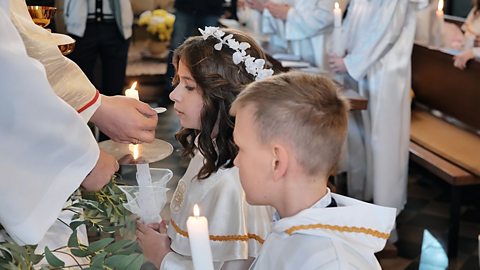
The local Church community is seen as a wider family by Christians. Caring for others expresses GodвҖҷs love and follows the example Jesus set. The local parish will strengthen the Church by supporting families to develop their faith, through faith ceremonies and non-faith activities:
Faith ceremonies can include family worship, baptisms, weddings and funerals. These ceremonies can give guidance, support and comfort to Christians.
Non-faith activities may also be organised by the local parish. These can include marriage guidance and childrenвҖҷs groups, such as toddler sessions.
Many Christian parishes see providing practical, emotional and spiritual support for all people in the community, as important.

GCSE exam-style question
Outline three ways the local parish supports family life.
Answers could include:
Providing education in the faith in schools, often attached to the Church.
Providing activities for the family such as parenting groups or toddler groups.
Being available for family milestones such as baptisms, weddings and funerals.
Marriage in Christianity
The nature and purpose of marriage
Many Christians view marriage as a gift from God and aвҖҜcovenantAn agreement or promise. between God and the couple. It is understood that the married coupleвҖҷs love for each other reflects the sacred love Christ has for the Church.
A Christian wedding ceremony
There are however, different understandings around the sanctityThe quality of being holy or sacred. and purpose of marriage within Christian denominationsA group within a religion. Christian denominations include, for example, Roman Catholic and Anglican denominations.. For example:
Many Christians believe that the main purpose of marriage is to honour God by following His command in the Bible to leave their parents to become husband and wife: "Therefore a man shall leave his father and his mother and hold fast to his wife, and the two shall become one flesh," (Mathew 19:4-6).
The command: вҖңBe fruitful and multiply," (Genesis 1:28) is interpreted by many Christians to mean that a couple should have children. Children are seen as a gift from God within Christian marriage based on this verse:
Children are a heritage from the Lord, offspring a reward from him.вҖқ
Psalm 127:3
- For many Roman Catholic Christians, theвҖҜsacramentRituals that teach, strengthen and express faith. They are relevant to all areas and stages of life, and Roman Catholics believe that the love and gifts of God are given through seven sacraments. of marriage is a public sign that an individual is giving themselves, totally, to another person. It is seen as a public statement about their belief because the loving union has God at the centre of it.
The married state has been established by the Creator вҖҰ God himself is the author of marriage."
Catechism of the Catholic Church 1604
For many Christians the вҖҳideal marriageвҖҷ of one man and one woman began with the creation of Adam and Eve вҖ“ each man should have one wife, and each woman one husband in a lifelong relationship. Christians believe that marriage is the ideal setting for sex between a couple. It provides a safe environment for children and teaches compromise, as couples try to live the way God wants them to do.
Christian marriage has a two-fold purpose вҖ“ fellowship and parenthood. Permanence in the union is an essential condition.
Methodist conference 1980
Some Churches, recognising the pressures on married couples, offer courses and support. These may include marriage preparation courses, marriage enrichment courses, divorce recovery workshops.
Humanists believe that marriage should be a secular tradition and so the couple can personalise it entirely, with no religious restrictions.
Polygamy
polygamyPolygamy is the practice of having more than one spouse.вҖҜis illegal in the UK. Whilst not commonly accepted within Christianity, some denominations such as Lutheran Christians or The Fundamentalist Church of Jesus Christ of Latter Day Saints (a denomination of Christianity in the USA), allow polygamy to take place, however, this is not widely practiced.
МэМэ
GCSE exam-style question
Explain two reasons on the importance of marriage in Christianity.
In your answer you must refer to a source of wisdom and authority.
Answers could include:
Many Christians view marriage as a gift from God and a covenant between God and the couple. It is understood that the married coupleвҖҷs love for each other reflects the sacred love Christ has for the Church: вҖңA man will leave his father and mother and be united to his wife, and the two will become one flesh," (Mark 10:6-9).
For Roman Catholic Christians, marriage is a sacrament and therefore blessed by God: "God himself is the author of marriage," (Catechism of the Catholic Church 1604).
Divorce and remarriage
Divorce is a legal process that ends marriage.
Jesus taught that anyone who divorced and remarried, except for sexual immorality, was committing adulterySexual intercourse between a married person and a person who is not their spouse.:
I tell you that anyone who divorces his wife, except for sexual immorality, and marries another woman commits adultery."
Matthew 19:9
Since adultery is forbidden in theвҖҜTen CommandmentsThe list of rules, revealed by God to Moses, found in the Old Testament books of Exodus and Deuteronomy. Also known as the Decalogue., most Christians do not undertake divorce lightly.
Situation ethics theorySituation ethics is a theory where the situation is taken into account first, before deciding on the rules of right and wrong. The only rule for this theory is agape - it should follow the most loving thing in any given situation as proposed by Joseph Fletcher. is where the circumstances of each individual situation are considered, and many Christians decide whether something is morally right or wrong based on the principle of agape loveSelfless, unconditional love for others.. Therefore, some Christians would accept divorce if it was felt that it was the most loving thing to do for all those concerned.
The Roman Catholic Church does not recognise divorce. According to Roman Catholic teaching, a marriage can only end when one partner dies or if there are grounds for anвҖҜannulment A way of ending a marriage that is different from a divorce and declares the marriage as invalid. It can be granted by the Catholic Church, and means that a marriage never legally existed. .
How do various Christian denominations view divorce?
The Catholic Church does not recognise civil divorce and teaches that the marriage continues in the eyes of God. Therefore neither partner can remarry in a Catholic Church.
Most Protestant Churches teach that divorce is not desirable but accept that divorce can happen when all other attempts to save the marriage have failed and care has been taken concerning the interests and future of any children.
The Anglican Church (which includes the Church of Ireland) does not advocate divorce, but it is allowed if the marriage has truly broken down and cannot be repaired. Someone who is divorced can remarry in an Anglican Church dependent on permission given by the Bishop.
Some denominationsA group within a religion. Christian denominations include, for example, Roman Catholic and Anglican denominations. including the Methodist Church or the United Reformed Church accept divorce and remarriage, as they see it as part of the Christian teaching of forgiveness. These Churches allow divorced people to remarry in church, although sometimes it is at the discretion of the minister.
Humanist views are sometimes similar to Christian views, however, because Humanists do not believe that a marriage is made before God, their views support divorce more readily.
All Christian denominations allow widows and widowers to remarry as their first marriage has ended in death.
So I counsel younger widows to marry, to have children."
Timothy 5:14
МэМэ
GCSE exam-style question
Explain two reasons why Christians disagree with adultery.
One reason why Christians disagree with adultery is because it seen as a sin and is forbidden. In the Ten Commandments it states: "You shall not commit adultery," (Exodus 20:14).
Another reason why Christians disagree with adultery is because it breaks the marriage vows and promises made before God, damaging the relationship with God as well as with the person to whom they had promised to be faithful to.
In pictures: Marriage, divorce and remarriage
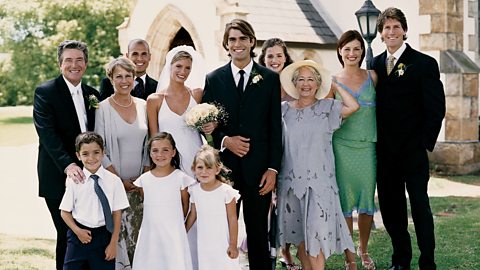
Image caption, The Bible says that a man will leave his parents and join his wife in marriage. Often, families come to celebrate the love and union of the couple, supporting them as they start their married life together.
Image caption, In Genesis 1:28, God commands couples to be "fruitful and multiply". One of the prayers in a church wedding mentions future children that the couple may have.
Image caption, The legal ending of a marriage is known as divorce. There is a divergence of views within Christian denominations about divorce. In many instances, the Church will offer marriage counselling to try to help prevent a divorce.
Image caption, Although not all Christian denominations accept remarriage, many Christians believe that a forgiving God would allow couples a second chance of happiness after the break-up of their first marriage. Christian teachings allow widows and widowers to remarry as their first marriage has ended in death.
1 of 4
Same-sex relationships in Christianity
The legal changing of the definition of marriage in the UK, to include same-sex couples has caused debate in many Christian organisations and communities. Some Christians use teachings from the Bible and Church traditions as evidence for not accepting that marriage should include same-sex couples.
Be fruitful and multiply."
Genesis 1:28
Some Christians see the above quote as an argument against same-sex marriage as these couples cannot fulfil this through natural conception. The Catholic Church and many Evangelical Christian Churches teach that marriage excludes same-sex relationships, as they believe that homosexual acts go against divine and natural law.
In some of St Paul's letters included in the Bible, he condemns men who have sex with men as вҖңunrighteousвҖқ and claims that men who practise homosexualityBeing attracted to people of one's own sex or gender. will not "inherit the Kingdom of God," (1 Corinthians 6:9-11).
Interpretation of Biblical verses about homosexuality has caused debate between many Christians, with some denominations arguing that the biblical teachings are outdated and donвҖҷt reflect modern views.

Other Christians accept that monogamousHaving a relationship with only one partner at a time. homosexual relationships can have the same values that are central to a Christian marriage. These Christians argue that it is not right to deny same-sex couples a marriage, simply because the union cannot result in children through natural conception.
Some Christian denominations, including the Quakers and the United Reformed Church, have conducted same-sex weddings since the new legislationA particular law, or a group of related laws passed by Parliament. came into effect, in 2013.
This quote from Quaker writings confirms their position:

We affirm the love of God for all people, whatever their sexual orientation вҖҰ to reject people on the grounds of their sexualвҖҜorientationвҖҜis a denial of GodвҖҷs creation."
Wandsworth Preparative Meeting, 1989
Atheist beliefs about sexual relationships differ, according to different understandings of human sexuality. Humanists believe sexual relationships are a matter of personal choice, as long as there is no harm done and everyone involved is happy with the choices being made.
МэМэ
GCSE exam-style question
Explain two Christian religious beliefs about same-sex marriage.
Refer to sacred writings or another source of religious belief and teaching in your answer.
Answers could include:
The book of Genesis states that a man and woman should leave their parents to become "one flesh" (Mathew 19:6) and have children. Therefore some Christian denominations, including members of the Roman Catholic Church, use this as evidence that same-sex marriage is unacceptable, because same-sex couples are not biologically able to conceive children.
However, other Christians, including Quakers, believe that Biblical teachings should be reinterpreted in light of more modern beliefs within society: "We affirm the love of God for all people, whatever their sexual orientation," (Wandsworth Quaker Preparative Meeting, 1989).
Sex before marriage
Some Christians believe sex before marriage devalues God-given sexuality: вҖңBut if they canвҖҷt control themselves, they should get married, because itвҖҷs better to marry than to burn with passion,вҖқ (1 Corinthians 7:9).
The Catholic Church teaches that sex should only take place within marriage:
Experience teaches us that love must find its safeguard in the stability of marriage, if sexual intercourse is truly to respond to the requirements вҖҰ of human dignity."
Catholic document, Persona Humana
Therefore some Christians will choose chastityRefraining from all sexual intercourse. before marriage:
Marriage should be honoured by all, and the marriage bed kept pure, for God will judge the adulterer and all the sexually immoral."
Hebrews 13:4
Cohabitation
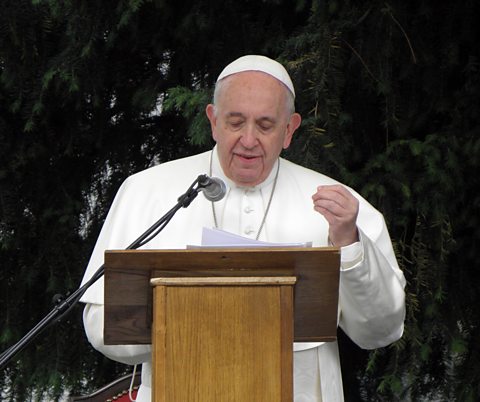
Many Christians accept that, although marriage is preferred, cohabitation is acceptable where there is faithfulness, loyalty andвҖҜcommitmentA pledge, promise or obligation. within a long-term relationship.
Pope Francis teaches that marriage is the appropriate context for sexual relationships, but he has also stated that this is a matter of conscience, rather than a strict rule. He recognises that financial and cultural issues may lead to cohabitation rather than marriage.
Pope Francis has commented on cohabitation. In The Joy of Love (2016)A document produced by Pope Francis, after a two year process in which bishops from around the world discussed the theme of love in families.he said: "In such cases, respect can also be shown for those signs of love, which in some way, reflect GodвҖҷs own love,".

Adultery
You shall not commit adultery.вҖқ
Exodus 20:14
This is one of the Ten CommandmentsThe list of rules, revealed by God to Moses, found in the Old Testament books of Exodus and Deuteronomy. Also known as the Decalogue. in Christianity.
Faithfulness within marriage is important to Christians. Teachings such as: вҖңBut a man who commits adultery has no sense; whoever does so, destroys himself,вҖқ (Proverbs 6 :32) support the view that couples should not commit adultery.
Contraception
Christianity teaches that children are a gift from God: вҖңChildren are a heritage from the Lord, offspring a reward from himвҖқ (Psalm 127: 3). However, some Christians accept there can beвҖҜpsychologicalRelating to the mind, eg mental attitude and personality., economic, environmental or medical factors that can impact on the decision to have a child and debate whether the use of contraception to prevent pregnancy is acceptable.
Be fruitful and multiplyвҖқ
Genesis 1:28
The Catholic Church takes this teaching as evidence that God has intended procreation. Many Roman Catholics believe that it is wrong to use any type of artificial contraception because it is not allowing God to work His plans through the couple by allowing the possibility of new life. However, the Roman Catholic Church does allow the use of natural methods.
Other Christians believe that it is acceptable to use contraception and do not accept that every sexual act should lead to the possibility of a child. As humans are made in the image of God, they have autonomy to make their own decisions when it comes to issues such as the use of contraception. For example, many Anglicans and Baptists believe that couples should only have the number of children that they can care for and accept the use of contraception when the couple may not be ready to start or grow a family.
Humanists accept the responsible use of contraception and many will consider the impact of different methods when deciding what's appropriate in the person's circumstance.
Video
Watch the video below to learn more about Christian, Jewish and Buddhist attitudes and teachings towards procreation.
Buddhist
Hello. I'm a Buddhist.
Christian
I'm a Christian.
Jewish
And I'm Jewish.
Buddhist
And our religions all agree that sex is an important part of a loving relationship.
Christian
So in the UK, the age of consent is 16. And when religions talk about a loving relationship, they usually mean marriage.
Jewish
One of the main reasons for that is to provide safe and secure conditions for procreationвҖҰ
Buddhist
вҖҰwhich means having a babyвҖҰ
Christian
вҖҰor babies.
Jewish
Some religious people say that whenever a couple has sex they should always be open to the possibility of procreation, because they believe that's what sex is for.
Buddhist
And this affects what they think about contraceptionвҖҰ
Christian
вҖҰthe methods that people use to prevent having children.
Jewish
So are there any circumstances where religious people accept the use of contraception?
Buddhist
Unlike most other religions, getting married and having children is not expected in Buddhism. In fact, some Buddhists believe that celibacy, not having sex and not getting married, is something to aim for. But if you choose to have sex, Buddhism teaches that it should be part of a committed relationship.
Christian
Christianity teaches that sex should only happen between people who are married. The Catechism of the Roman Catholic Church, which lists all its beliefs and rules, says that every time a couple has sex, they should be open to the possibility of pregnancy.
Jewish
And many Jews would agree with that. The Torah says that God told his people to 'Be fruitful and multiply'. So many of us take that as a mitzvah, a commandment to get married and have children.
Buddhist
But many Buddhists would disagree. Sex doesn't always have to be about having children. We believe it can help a couple to develop 'metta', loving kindness and 'karuna', compassion. So some forms of contraception are accepted. We try to live by the principle of 'ahimsa', which means non-violence or non-harming. And Buddhism teaches that life begins at conception. So barrier methods of contraception are accepted, non-barrier methods are generally not.
Christian
Many Christians would agree that life begins at conception. In the Bible, the writer of Psalm 139 talks about God seeing my 'unformed body' in the womb. So the Roman Catholic Church teaches that if a married couple wants to avoid pregnancy temporarily, then they should use natural family planning methods rather than contraception. The only exception to the no contraception rule is if a pregnancy would put a woman's health in danger. Protestant churches, like the Church of England, the Methodist Church and the Baptist Church, generally do accept that most couples will use contraception, but they also encourage them to have families when they feel ready.
Jewish
Orthodox Judaism generally instructs couples not to use contraception, so that pregnancy remains a possibility. However, an ancient collection of Jewish writings, called the Talmud, does allow it if there are good medical reasons for not getting pregnant. Many Conservative and Reform Jews accept the use of contraception, but itвҖҷs still seen as the couple's duty to have children.
Buddhist
As a Buddhist, I believe human life is precious. I think all people do. So I'd need to think carefully about bringing a baby into the world. Contraception is definitely something I would want to consider so I can plan when to have a family.
Christian
So all our religions agree that sex should be part of a loving and committed relationship.
Jewish
But we don't agree that sex always has to be open to the possibility of procreation.
Buddhist
Some religions accept the use of contraception either to prevent having childrenвҖҰ
Christian
вҖҰor to space out their birthsвҖҰ
Jewish
but the kind of contraception used and the reasons for using it can depend on when a religion believes that life begins. But what do you think?

МэМэ
МэМэ
Remember
МэМэ
Some Christians will apply the theory of Situation ethics theorySituation ethics is a theory where the situation is taken into account first, before deciding on the rules of right and wrong. The only rule for this theory is agape - it should follow the most loving thing in any given situation as proposed by Joseph Fletcher. when it comes to making ethical decisions in relation to family life.
The roles of men and women
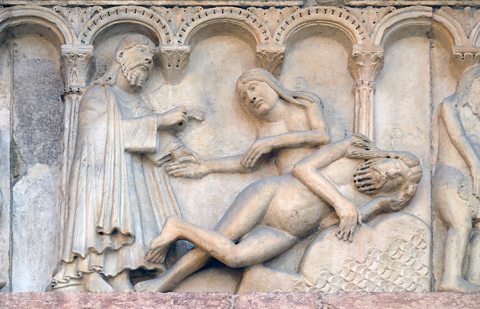
There are differing thoughts and practices among Christian denominations on the roles of women and men in worship.
The Book of Genesis states that women were created to be helpers: "But for Adam no suitable helper was foundвҖҰThen the Lord God made a woman from the rib he had taken out of the man,вҖқ (Genesis 2:20-22).
Some Evangelical Christians believe this is evidence that, in worship, men should be the leaders and women should be the helpers. Some Christians also believe that, as JesusвҖҷs twelve disciples were male, this is further evidence that men should lead in Christianity.
Some Catholic and traditional Protestant churches see this quote as further evidence that The Church should be led by men and do not allow women priests:

Women should keep silent in the churches вҖҰ it is improper for a woman to speak in church."
Corinthians 14:34вҖ“35
However, many Christians believe these views do not hold a place in todayвҖҷs Christian society. They may argue that the Bible was written at a time of male dominated society therefore gender inequalityWhere a system means some people are better off than others, such as in pay, working rights or the law. was common. Many Churches today reflect the belief that both men and women were created equally in GodвҖҷs image, therefore both should have a leading role in worship, вҖңSo God created mankind in his own image, in the image of God he created them; male and female he created them," (Genesis 1:27).
The Quakers, The Salvation Army and the Anglican Church all allow female ministers and believe that as God loves us all equally, gender in leadership is not important.
Nor is there male and female, for you are all one in Christ Jesus.вҖқ
Galatians 3:28
МэМэ
GCSE exam-style question
Explain two Christian beliefs about equality of men and women.
Answers could include:
Some Evangelical and Roman Catholic Christians might understand from Biblical teachings that the husband is the head of the family, and that the wife should act as his assistant and therefore she will have a different role to him: "But for Adam no suitable helper was foundвҖҰThen the Lord God made a woman," (Genesis 2:20-22).
Other Christians might use the Biblical teachings in Genesis, that all humanity was made in the image of God, вҖңSo God created mankind in his own image," (Genesis 1:27) as meaning that men and women are equal and can have equal roles in the home and in worship, based on the individual circumstances.
Christianity scripture quiz
Marriage and the family Christianity quotes
1 of 5
